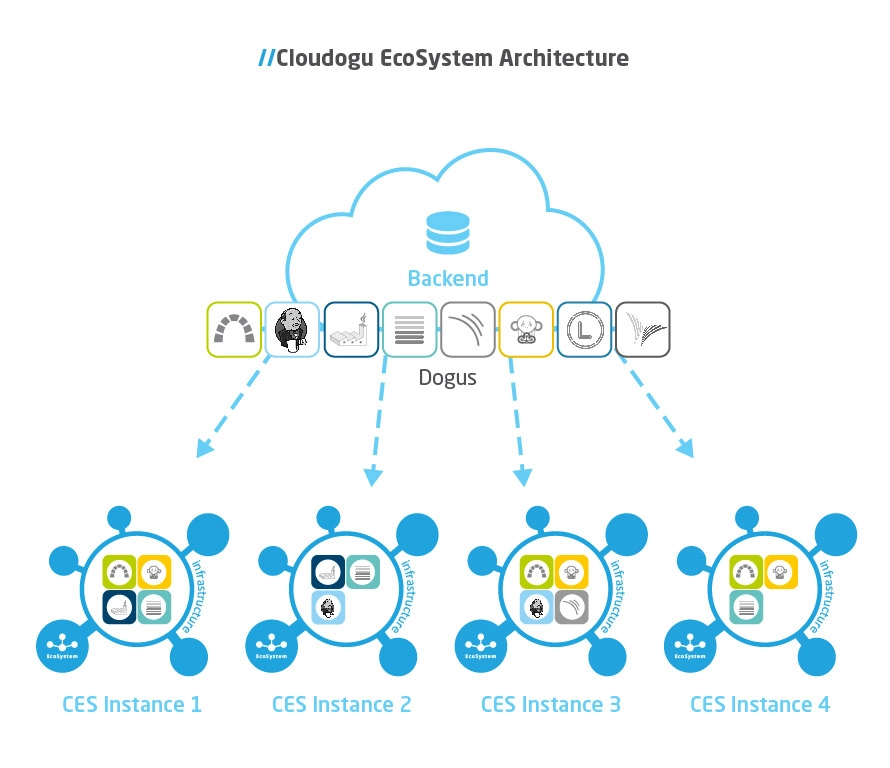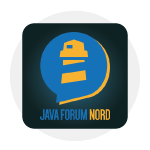
Advantages of a Hybrid Cloud Infrastructure
Public vs. Private vs. Hybrid
Since companies have very different requirements when it comes to data security, maintenance costs, security, legal compliance, etc., various cloud models have been developed. A basic distinction can be made among “public”, “private” and “hybrid” cloud architectures. Public clouds are infrastructures where the public can access resources, such as computing capacity, services, virtual machines, or storage space. Private clouds offer the same resources and functions, but are deployed on internal resources. Hybrid clouds also offer the same resources and functions, except they do so on a combination of private, public, and on-premises resources. An example that will be described in more detail later, is the Cloudogu EcoSystem.
Advantages of a hybrid-cloud architecture
Generally, a hybrid-cloud architecture has the great advantage over the other operating models, because it is not necessary to commit to using an exclusively public or private cloud. Depending on your own requirements for security, data protection, performance, and costs, you can decide where an application should be operated and who should be able to access it. The following aspects should be considered as the key factors influencing your decision:
Security
It is very difficult to stay up-to-date with all of your applications. Public and private cloud operators regularly perform security updates, freeing you from having to perform this task yourself. However, they are also attractive targets for finding and exploiting vulnerabilities. Depending on the amount of data that is stored and processed, it is therefore important to evaluate how much effort your company is willing to devote to security.
Data protection
There are a number of reasons why data should not be stored in a public or private cloud. Wherever personal or sensitive data is processed and stored, you must always consider data protection. Not least because the Safe Harbor and Privacy Shield agreements between the EU and the USA have been ruled invalid, decisions must also be regularly checked against the current legal framework, which is constantly changing.
Performance
The further away a server is from the user and the more nodes there are between them, the slower and more error-prone a connection becomes. It is also important to consider how fast a connection to a user must be.
Costs
As is true of everything in life, nothing is free. Regardless of whether you choose a public, private, or hybrid cloud, there are always costs. Cloud services have a wide variety of pricing models, which in some cases make it very difficult to estimate the costs in advance. Even with on-premises operation, it can be difficult to calculate the true costs of operation.
Hybrid Cloud Example with Cloudogu EcoSystem Architecture
The Cloudogu EcoSystem is a platform for software development tools, that combines selected tools in a virtual machine. Each virtual machine, we call it an instance, is connected to the central backend by registration. The tools for each instance are downloaded from the backend. This architecture allows to independently decide for each instance where it should be operated, regardless of whether this is on-premises or in a public or private cloud. This provides you with all the options that you need to build your own hybrid cloud.
This architecture offers the following benefits.
Security
Thanks to the Cloudogu EcoSystem, you have the freedom to operate your entire toolchain exactly where you want it. So you can use your preferred cloud provider or operate the platform on your own server. At the same time, you have full control over how the tools are updated.
Data protection
Due to the complexity of internet-based services (laws of the country governing your own company or a service provider and the country in which a server is located), there are a multitude of factors that affect data protection. Companies are acquired (e.g., Microsoft buys GitHub), changed laws introduce new requirements (e.g., the GDPR), or agreements are terminated (e.g., Privacy Shield). The freedom to choose where these tools and services are operated and who is allowed to use them can eliminate some of these factors. Thanks to the Cloudogu EcoSystem and the freedom of operation that it affords you, it is possible to address many of these factors and thereby gain more security when it comes to data protection.
Performance
With the Cloudogu EcoSystem, you can easily scale the infrastructure for your team of software developers both vertically and horizontally. For horizontal scaling, you can easily provide your teams with additional instances, e.g., in order to provide enough resources for an individual development pipeline for a project or to reduce the number of users per instance. For vertical scaling, all you have to do is assign more resources to an instance. Note: You can find more information here about the reasons why you might want to operate multiple instances.
Costs
If you find that it is important to operate your development toolchain or parts of it yourself, you can significantly reduce the time and financial expenditures required with the Cloudogu EcoSystem. Updates for all integrated tools are tested before they are released so that major updates can also be rolled out with little effort. They are also provided uniformly, which makes the process very efficient. Note: You can find more information about the installation and operating costs of the Cloudogu EcoSystem here.
Cloudogu EcoSystem
Convince yourself of the advantages of the Cloudogu Ecosystem. Use the modern DevOps platform now for free.
Learn more about itConclusion
Generally a hybrid cloud architecture offers the advantage that individual requirements can be taken into account. Therefore, it offers more flexibility than an architecture that is limited to a single kind of cloud. Thanks to its hybrid architecture, the Cloudogu EcoSystem utilizes these advantages and makes them available to users without any extra installation and configuration.





